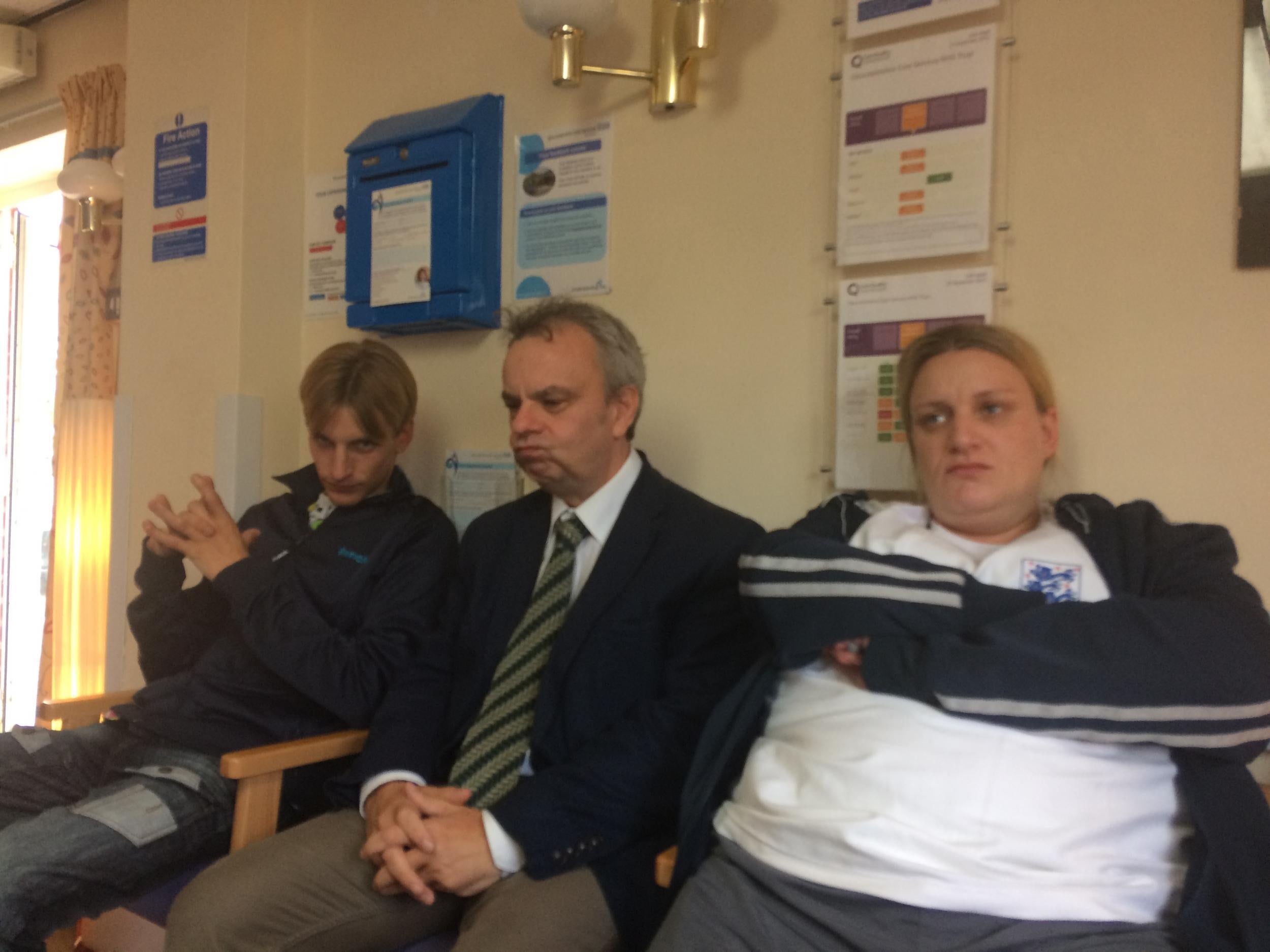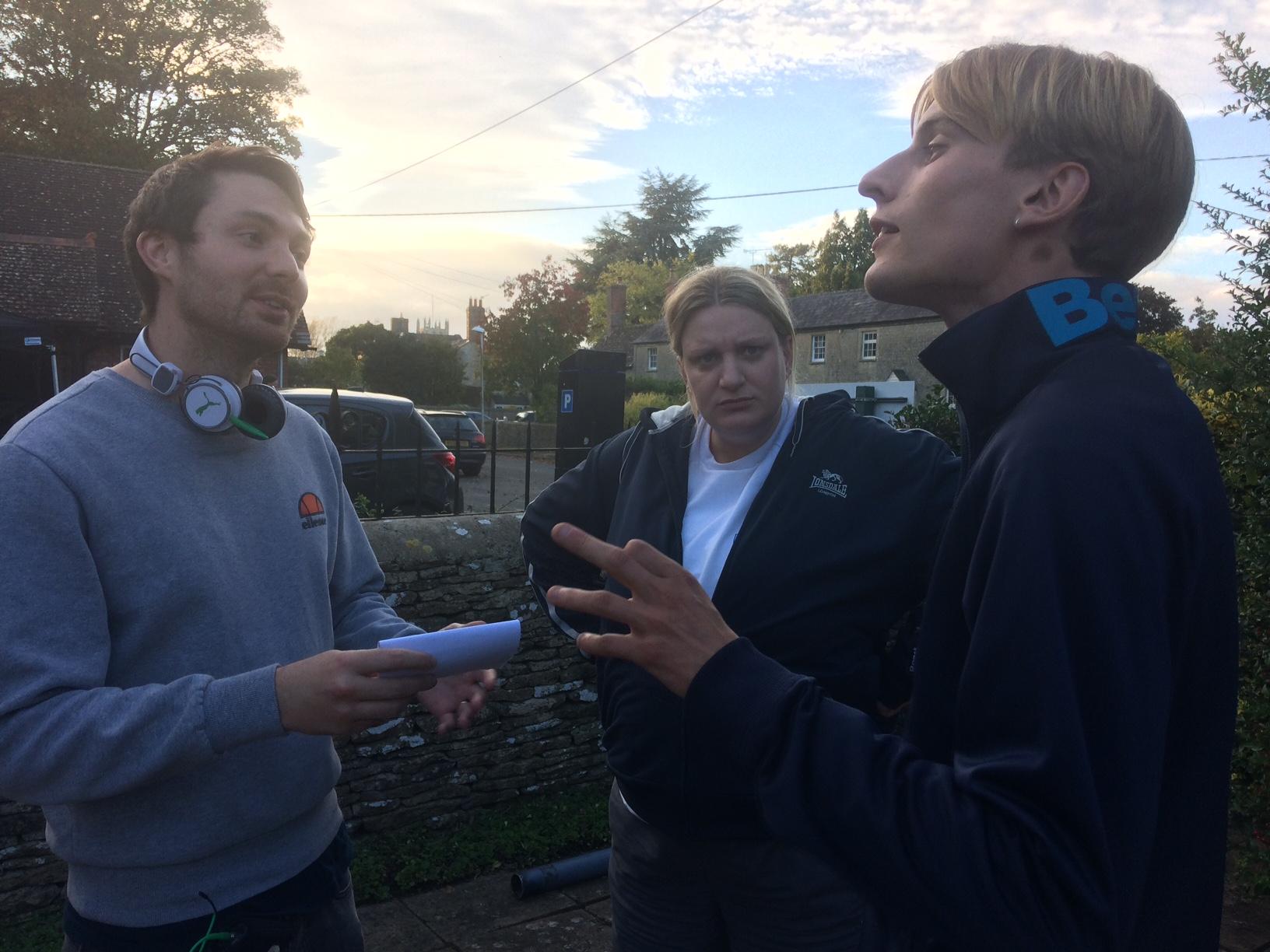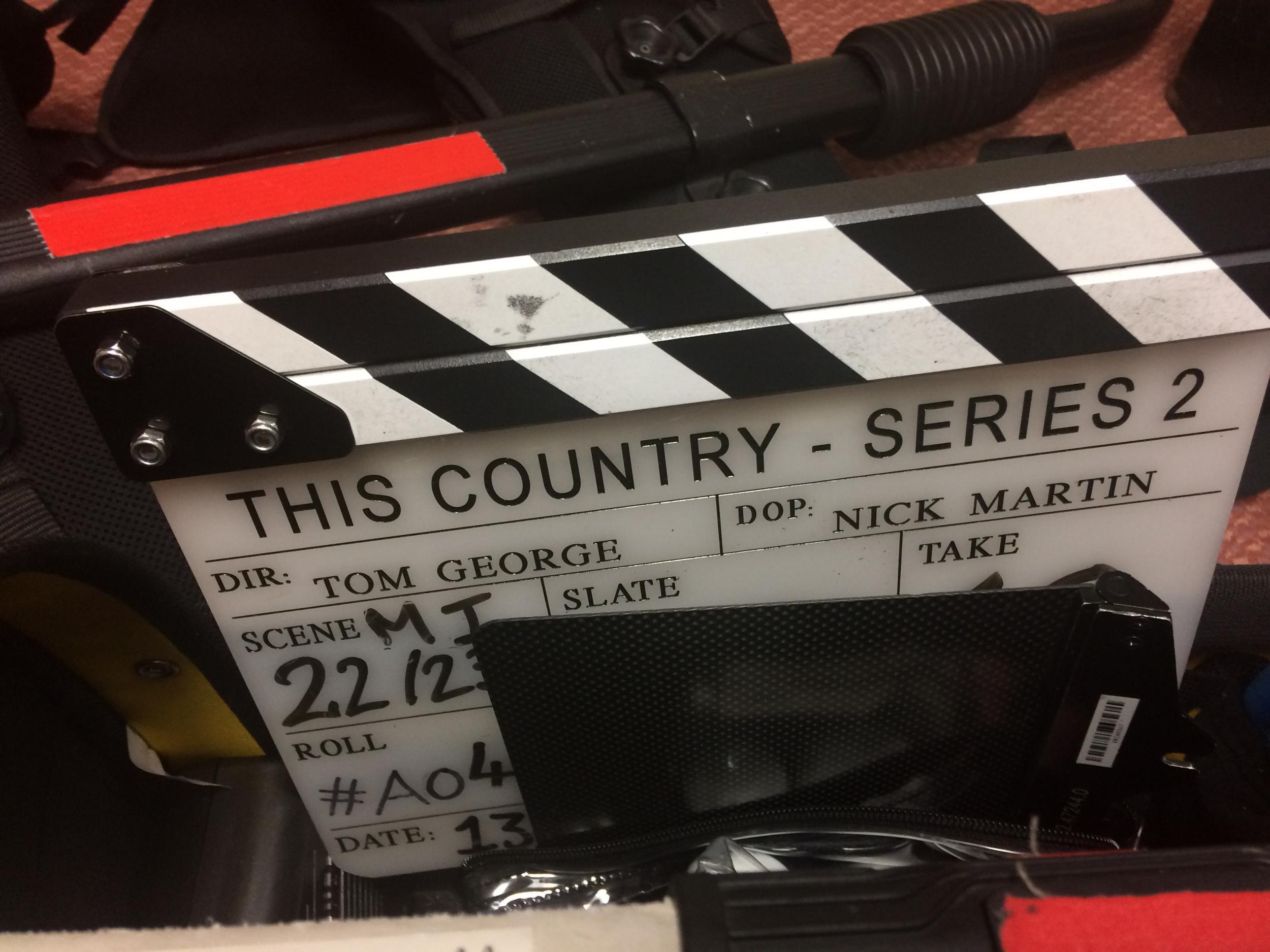This Country: A day on the set of the hit BBC Three series
Sick of working odd jobs just to survive, Daisy May Cooper hounded production companies with a short sketch about Kerry, the lead character in the now critically acclaimed comedy. Sean O’Grady dusts off his acting skills and joins the actress and her brother on set

“I’m farting a lot these days.” Daisy May Cooper, one half, with her brother Charlie, of the team behind the hit BBC comedy This Country vouchsafed this to me after I congratulated her on the news that she’s expecting a happy event. We had just finished our lunch on location in the Cotswolds, filming the second series of the show. The mini Cooper is due to arrive on 3 January, and I can also exclusively reveal that the father is not “Slugs”, the mumbling simpleton played by her friend (believe it or not, given how he’s portrayed) Michael Sleggs. She’s finding pregnancy “quite mental”. There is, shall we say, nothing pretentious about this giantess of comedy – who is becoming still more gigantic.
“They’ve made a fat suit for me,” she explains, “to hide the bump.” She hitches up her knock-off England shirt (the fourth lion being the dead giveaway) to reveal a work of foam rubber and elasticated engineering that might rival the Thames Barrier for its structural ingenuity. This is logical, I suppose, because there’s no room for a preggers Kerry, Daisy’s character, in the scripts for this second series – far too much dramatic development required there. Yet it does make Kerry into even more of a heavy unit than in the first series, with her delusions about her hardness, local power and vulnerability to her “enemies” correspondingly and amusingly inflated.
For those suffering the misfortune of having missed the first run of This Country, and thus some comedic malnutrition, I should explain that this BBC3 mockumentary is one of the most inventive and finely crafted pieces of television to appear on our screens for a very long time.
In accomplishment and “slow burn” critical acclaim This Country resembles Ricky Gervais’s pioneering, and still peerless, The Office (which arrived 16 years ago). Writers/siblings Charlie and Daisy Cooper also play cousins Kurtan and Kerry Mucklowe, a pair of kids who want to grow up but can’t quite manage it (mostly Kurtan) or simply don’t want to (Kerry). They are inspired by their experiences of small-town life in the West Country. Daisy explains the genesis of Kerry Mucklowe thus: “It was an impression that started of this girl in our town, Cirencester. She’s still around, still goes around with kids that are much younger than her intimidating people and just being really aggressive for no reason.”

“Apparently the other day she was walking through the park with some kids swearing really loudly at people trying to have picnics just for the sake of being hard.”
“I was terrified of her growing up. She had a following. She was Sheriff of the town. There’s a story where one of my friends snogged some guy, some girl’s boyfriend and this girl, the Kerry character, found out about it and she said right, you’ve got to meet me at the Roman amphitheatre and let me punch you once, because if you don’t I will make your life a living hell, and my friend went to me, ‘Right, I’ve got to let her punch me.’ I said that’s absolute madness, she’s not the justice system, but she did – she went to the Roman amphitheatre of all places and got punched”.
In the deadpan words of the opening credits of This Country: “In rural Britain today, studies show that young people feel more marginalised than ever. To explore this problem the BBC spent six months filming with some young people in a typical Cotswolds village.”
In journalese, my native tongue, it’s a chronicle of chav life in the West Country (no disrespect intended by me or the creators). The action – if that’s the right word for the insular, self-centred and parochial activities and outlook of the main characters and their lives in a village (much of it filmed in Northleach and Fairford, Gloucestershire) – of this Cotswolds world is very different to the cosy gin-and-Range-Rover lifestyles of the Chipping Norton set, that is. It is a darker, rougher, bleaker place than that, as it is for many in reality. Plots in the last series centred on, variously, the celebration of the death of a hated woodwork teacher, arson at a scarecrow competition, turkey dinosaurs, pyramid selling, and voyeurism. They even managed a joke about Fred West. It’s audacious, eccentric and funny.
According to Charlie their relative failure in conventional work and consequent enforced incarceration in the west Cotswolds “meant we couldn’t do anything else but stay together. It came out of boredom and frustration, the writing, because there was nothing else”. Like Kurtan and Kerry, they were “left behind” as their mates left the area to make lives for themselves. They, though, remained in a state of perpetual immaturity or arrested development. Charlie dropped out of his university degree in sports science, though Daisy enjoyed a better start – training at Rada, no less. Daisy says: “After leaving Rada my mum said, ‘You’ll be fine, you’ll be the female James Bond, you’ll get lots of money and be the next big thing.’”
But 50 failed auditions suggested otherwise. “There have been so many. The worst was for Call the Midwife when every single syllable had the wrong emphasis. My agent at the time got her assistant to call me and say the casting director of Call The Midwife phoned and was very concerned and felt I hadn’t even bothered to learn the script, which I had but I was so terrified.”

In the last recession the Coopers suffered money troubles: “Money was so short there was nothing left after the £9 National Express bus fare to London, so not enough for the Tube fare. I had to walk there in sandals that had fallen apart and I had to hold them together with parcel tape, so that was obviously one of the biggest things, trying to hide my shoes.”
Daisy had a disastrous spell as a would-be pole dancer, and on a night cleaning job the pair confined their vacuuming to only the most visible bits of carpet, and never changed the bin liners, preferring instead to pick out the banana skins and the rest. Sacked from it, they were simply driven by desperation and a creative urge into writing, inspired by their predicament and that of those around them. Adds Daisy, “I had an agent who forgot who I was and I thought f*** it and I sent a short sketch about Kerry to every single production company.”
Raw material could be sourced readily. Kurtan, for example, takes his name from an encounter in the boozer: “We met this guy in a pub talking about how he and his mate Kurtan should go on Celebrity Big Brother as a pair as he’s such a laugh, this bloke called Kurtan.”
“The story was so funny we thought we’d match his ‘curtain’ hairstyle with his name.”
We left Kurtan at the end of the last series on his way to Swindon College to do a GNVQ, but of course he winds up back in the village with Kerry. Kurtan, unfairly, blames the vicar (actor Paul Chahidi) for his predicament, and takes it out on him. Charlie adds that in this series “we try to see what Kerry and Kurtan actually want”.
Kurtan now has a girlfriend, an obvious threat to Kerry’s selfish monopolising of his time and emotional energies. Slugs is still in a relationship with Kayleigh (Celeste Dring), though he is confronted with a disturbing side to her sexual appetites. The vicar has a wife and son, we learn, as well. This slightly more soapy treatment lends some storyline arcs across the episodes. Other prominent figures in the lives of the Mucklowe cousins are reassuringly present: Kerry’s sod of a dad, Martin, (in fact her actual father, Paul Cooper, who is not a sod); her off-screen mum (a strongly regional accented “Tomaaato!” being her catchphrase); village super grump Len Clifton (Trevor Cooper, real-life uncle to Daisy and Charlie) who acquires an “angry” neighbour, and Mandy (Ashley McGuire), the worst tattooist in the west, now with added martial arts skills.

This is the ensemble cast who do so much, as in Dad’s Army or The Office, say, to sustain the principal players and the laughs – and they are also greatly blessed by their producer, Simon Mayhew-Archer, and director Tom George, as committed to their craft and the success of the show as anyone, including the Coopers themselves. I joined them for a day’s filming, and was even roped into a very small part – an instructive experience. Even as an extra (I don’t mean that condescendingly, as I can see it is hard work) you can feel the craft and skill in the creative process. Experiencing a scene evolve from script to improvisation to script again over a two-hour process of a dozen takes is an educative thing.
If all this sounds gushing or sycophantic, it’s meant to be; critics enjoy knocking the dross and flops on the telly, but when something of exceptional quality arrives, well why not say so? With an impressive support team of script supervisors, technicians, make-up artists, camera operators and goodness knows who else this was impressive stuff. There was a lot of laughter. They say that the best comedies are created when the crews on set have fun, and if that’s true then the second series of This Country should be brilliant.
The gossip is that the second series will be screened in around February next year, and I can’t wait. Those who “get it” love it for the richness of the dialogue and attention to detail, right down to a discarded pair of Spider-Man pants (“with skidders in them”). Kerry’s fashion sense resembles, in Charlie’s words, “an explosion in an unofficial merchandise factory”, while Charlie favours top names of the 1990s, such as Bench, in the TK Maxx sale.
Thanks for This Country should also rest with BBC head of comedy Shane Allen, who was stalked by the Cooper until he gave in and gave us this gem. With W1A and People just Do Nothing, the BBC, and BBC3 especially, is going through a powerful comedy revival, something we should all be grateful for.
My only concern is what Daisy and Charlie will turn to when they’re done with This Country. Success creates problems, too. It can be difficult to move on – even the likes of Ricky Gervais and Steve Coogan have found it a very substantial challenge to cohabit with David Brent and Alan Partridge.
The Coopers may have more success, though, if they prove their versatility. To me, they seem to have something of the writing genius of Ray Galton and Alan Simpson about them, the same delight in words, and the same fascination with the tensions in close, symbiotic relationships, exploring and stress-testing the same themes of frustrated ambition. In Galton and Simpson’s Steptoe and Son, for example, there was, famously, the son Harold’s aspirations to escape being a rag and bone man cynically thwarted by his dad, while in their work with Tony Hancock we found the character’s ambitions to get out of Railway Cuttings, East Cheam usually defeated by their first skirmish with reality.
Maybe there could be some sort of American spin-off of This Country set in, say the Trump “left behind” country of West Virginia or in Kansas (as with The Office and other UK exports). Or maybe they will try something more innovative. I look forward to the Coopers’ next comedic baby, in any case. Maybe I’ll get a part.
The second series of ‘This Country’ will air on BBC3 in 2018
Join our commenting forum
Join thought-provoking conversations, follow other Independent readers and see their replies
Comments
Bookmark popover
Removed from bookmarks